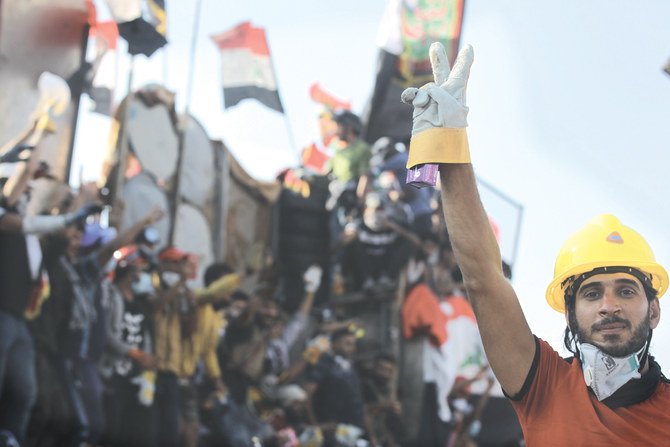
- ARAB NEWS
- 12 Jul 2025

Suadad Al-Salhy
BAGHDAD: Iraqis have defied a crackdown to stage their biggest protests yet after the country’s leading Shiite cleric warned the government against the use of violence to curb demonstrations.
The number of protesters on the streets of Baghdad and Iraq’s southern provinces more than doubled in the past 24 hours, security officials and eyewitnesses told Arab News.
On Wednesday two people died in clashes between security forces and protesters who ignored a curfew in the capital.
Almost 150 demonstrators have been killed and another 7,000 injured since Iraqi Prime Minister Adel Abdul Mahdi and his allies led a brutal crackdown on the demonstrations.
Protests were halted for two weeks, but resumed on Friday after the government promised live ammunition would not be used against demonstrators.
Public anger at corruption, unemployment and lack of basic daily services in the country have left Abdul Mahdi’s political future in limbo. Grand Ayatollah Ali Al-Sistani, leader of the world’s Shiite community and Iraq’s most influential cleric, urged the Iraqi government and its allies not to involve troops in dealing with protesters.
In an open letter read by his representative Sayyed Ahmed Al-Safi during Friday prayers, Al-Sistani said: “The blood that has flowed over the past few weeks is precious to us all. It is necessary to work to prevent further bloodshed and never allow the country to slide into internal fighting, chaos and devastation.
“The Marjiya (Al-Sistani) urges the concerned authorities not to involve any combat forces in dealing with demonstrators and sit-ins for fear of being drawn into further violence.”
The cleric also sent “a powerful and clear message” to Iraq’s regional and international allies, and to Iran’s supreme religious leader, Ali Khamenei, who called for an end to demonstrations in Iraq and Lebanon on Wednesday.
“Respecting the will of the Iraqis to determine their political and administrative system of their country by holding a referendum on the constitution and the periodic elections for the Parliament — this is the principle that the religious authority has committed to since the change of (Saddam’s regime).
“Today it also affirms that reform, although inevitable, is the choice of the Iraqi people,” Al-Sistani’s letter read.
“No person, group, or regional or international party has the right to confiscate the will of Iraqis and impose their opinion on them,” it added.
In Baghdad, hundreds of families joined protesters in Tahrir Square on Friday, while others shared their food with demonstrators on the sidewalks.
Iraqi intelligent officials told Arab News that the number of protesters grew after Friday sermons with women and the elderly making up the bulk of the newcomers, especially in the capital.
“These demonstrations will not end soon and it is very difficult for the government to use force to end them anymore,” a senior intelligence official said.
“No sane person can ignore these people, especially after Al-Sistani’s comments,” he added.